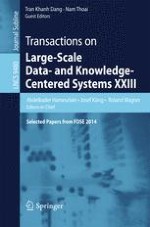This volume, the 23rd issue of Transactions on Large-Scale Data- and Knowledge-Centered Systems,focuses on information and security engineering. It contains five revised and extended papers selected from the proceedings of the First International Conference on Future Data and Security Engineering, FDSE 2014, held in Ho Chi Minh City, Vietnam, November 19-21, 2014. The titles of the five papers are as follows: A Natural Language Processing Tool for White Collar Crime Investigation; Data Leakage Analysis of the Hibernate Query Language on a Propositional Formulae Domain; An Adaptive Similarity Search in Massive Datasets; Semantic Attack on anonymized Transactions; and Private Indexes for Mixed Encrypted Databases.
